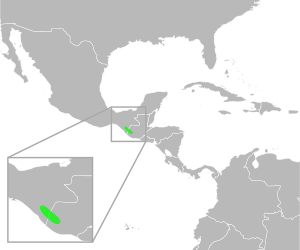Incilius tacanensis facts for kids
Quick facts for kids Incilius tacanensis |
|
|---|---|
| Conservation status | |
| Scientific classification |
|
| Kingdom: | Animalia |
| Phylum: | Chordata |
| Class: | Amphibia |
| Order: | Anura |
| Family: | Bufonidae |
| Genus: | Incilius |
| Species: |
I. tacanensis
|
| Binomial name | |
| Incilius tacanensis (Smith, 1952)
|
|
 |
|
| Script error: The function "autoWithCaption" does not exist. | |
| Synonyms | |
|
Bufo tacanensis Smith, 1952 |
|
Script error: No such module "Check for conflicting parameters".
The Incilius tacanensis, also known as the Volcan Tacana toad, is a special kind of toad. It belongs to the Bufonidae family, which includes many types of toads. This toad was first described by a scientist named Philip W. Smith in 1952.
You can find this toad in specific parts of North America. It lives in western Guatemala and the eastern area of Chiapas in Mexico. Its name comes from Volcán Tacaná, a volcano where it was first discovered. This place is called its type locality.
Contents
About the Volcan Tacana Toad
The Volcan Tacana toad is a unique amphibian. Amphibians are animals that can live both on land and in water. Toads are known for their bumpy skin and often prefer drier places than frogs.
Where It Lives
The natural home, or habitat, of the Volcan Tacana toad is a special kind of forest. This forest is called a premontane tropical forest. "Premontane" means it's found at the lower slopes of mountains, and "tropical" means it's warm and wet.
Its Home and Habits
These toads love places with lots of trees and moisture. Scientists believe that the Volcan Tacana toad is a "stream breeder." This means they lay their eggs and their young, called tadpoles, grow up in streams. Streams are important for their reproduction and life cycle.
Why It's in Danger
Sadly, the Volcan Tacana toad is a very rare species. This means there are not many of them left in the wild. They are considered an endangered species.
Threats to Its Survival
The main reason this toad is in danger is habitat loss. This happens when their forest homes are destroyed or changed by human activities. For example, forests might be cut down for farming or building.
Another big threat is a disease called chytridiomycosis. This is a serious fungal disease that affects amphibians all over the world. It can be very deadly for toads and frogs. Scientists are working to understand and fight this disease to protect species like the Volcan Tacana toad.
See also
 In Spanish: Incilius tacanensis para niños
In Spanish: Incilius tacanensis para niños
 | Kyle Baker |
 | Joseph Yoakum |
 | Laura Wheeler Waring |
 | Henry Ossawa Tanner |


